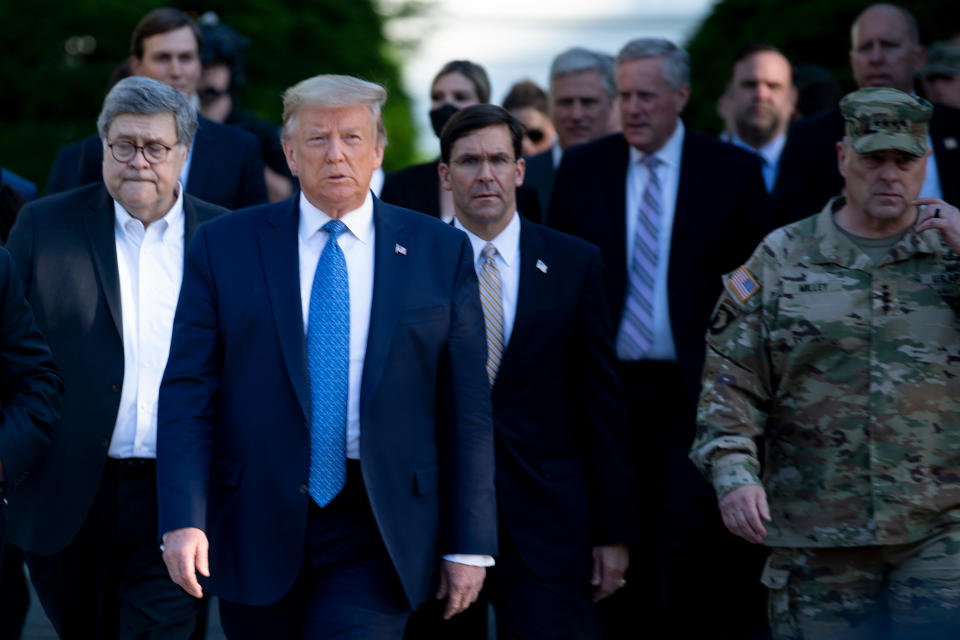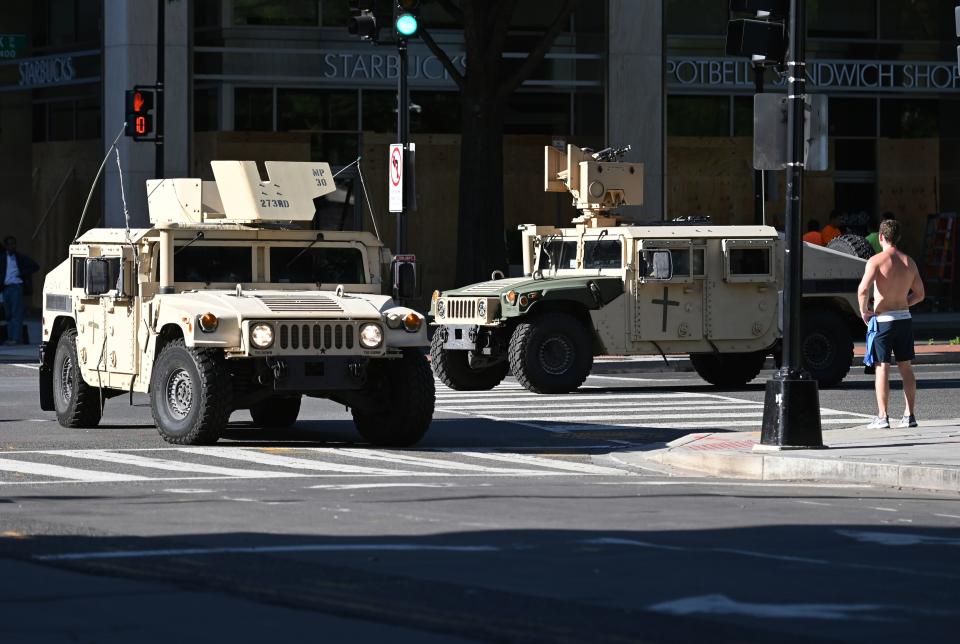Trump plan to deploy troops in cities shocks generals and alarms Democrats in Congress
Retired top generals reacted with alarm Tuesday to President Trump’s plan to use active-duty military to patrol cities where police have failed to contain violence, while Democrats in Congress said they would seek to block funding for any domestic troop deployment.
Sen. Tim Kaine, D-Va., said that he would introduce an amendment to the National Defense Authorization Act that would outlaw the use of Defense Department funding to be used against American citizens engaged in protest demonstrations.
Next week the Armed Services Committee will debate the NDAA—which determines how the DoD can spend its money. I will introduce an amendment to prevent any DoD funding from being used for force against American citizens exercising their first amendment rights.
— Tim Kaine (@timkaine) June 2, 2020
On Monday, after nearly a week of protests, vandalism and looting sparked by the death of George Floyd at the hands of Minneapolis police, Trump was photographed walking outside the White House alongside Defense Secretary Mark Esper and the fatigue-clad Gen. Mark Milley, chairman of the Joint Chiefs of Staff, as military vehicles crisscrossed Washington and helicopters hovered low to disperse protesters.
Moments earlier, the president said he was “taking immediate presidential action to stop the violence and restore security and safety in America.”
“I am mobilizing all available federal resources — civilian and military — to stop the rioting and looting,” Trump added.

Senate Minority Leader Chuck Schumer, D-N.Y., blasted the president for what he saw as a “blatantly unconstitutional” use of his power.
President Trump ordered federal officers to attack peaceful American citizens exercising their constitutional rights by tear gassing them in a public park while military helicopters flew overhead.
Appalling. An abuse of presidential power. Blatantly unconstitutional.— Chuck Schumer (@SenSchumer) June 2, 2020
In a separate tweet, Schumer said “the Department of Defense Inspector General must launch an investigation into how the military is being used.”
While the Posse Comitatus Act prohibits the military from being used in domestic law enforcement, the Insurrection Act of 1807 provides a loophole. It allows a president to send in U.S. troops to suppress a domestic insurrection if requested to do so by a state governor. No such request has been made in the District of Columbia, which does not have a governor, and it is unclear whether any other states have asked for such help. Several governors have said they had no interest in having active-duty troops deployed in their states.
The law does have a provision for the president to act unilaterally in certain extreme situations. Trump has not said publicly that he is invoking the act.
The National Guard, which has been deployed in Minneapolis, is generally controlled by the respective governors.
House Armed Services Committee chairman Adam Smith, D-Wash., issued a statement Tuesday criticizing Trump for failing to calm racial tensions.
“Instead he used force to remove peaceful protestors to stage a photo opportunity. Instead of taking a moment of silence in front of the historic St John’s Episcopal Church to pray for the lives lost, he gathered his cronies to take a picture. Instead of doing the right thing, he once again did the absolute wrong thing,” Smith said in his statement.
“I remain gravely concerned about President Trump’s seemingly autocratic rule and how it affects the judgement of our military leadership,” Smith added. “I have called for Secretary of Defense Mark Esper and chairman of the Joint Chiefs of Staff Gen. Mark Milley to testify before our committee to explain this domestic engagement to the American people. The fate of our democracy depends on how we navigate this time of crisis.”

Former top military officials also took issue with Trump’s use of U.S. soldiers to counter demonstrators.
“It sickened me yesterday to see security personnel — including members of the National Guard — forcibly and violently clear a path through Lafayette Square to accommodate the president’s visit outside St. John’s Church,” retired Gen. Mike Mullen, a former head of the Joint Chiefs of Staff, wrote in an extraordinary op-ed in the Atlantic. “I have to date been reticent to speak out on issues surrounding President Trump’s leadership, but we are at an inflection point, and the events of the past few weeks have made it impossible to remain silent.”
Another former head of the Joint Chiefs of Staff, retired Gen. Martin Dempsey, was similarly bothered by Trump’s actions.
America’s military, our sons and daughters, will place themselves at risk to protect their fellow citizens. Their job is unimaginably hard overseas; harder at home. Respect them, for they respect you. America is not a battleground. Our fellow citizens are not the enemy. #BeBetter
— GEN(R) Martin E. Dempsey (@Martin_Dempsey) June 1, 2020
Retired Gen. Tony Thomas, former head of Special Operations Command, said Trump’s promise to flood the streets of America’s cities with U.S. soldiers is “not what America needs to hear.”
The “battle space” of America??? Not what America needs to hear...ever, unless we are invaded by an adversary or experience a constitutional failure...ie a Civil War...
— Tony Thomas (@TonyT2Thomas) June 1, 2020
A poll released Tuesday that was conducted by Morning Consult before Trump promised to use U.S. troops to put down the protests nationwide, found that 58 percent of Americans supported calling in the military to help local police while 30 percent opposed doing so.
The same poll, however, found that 56 percent of voters rated Trump’s response to the demonstration “only fair” or “poor,” while 32 percent rated his response positively.
A poll conducted by CBS News and released Tuesday found 49 percent of Americans disapproved of Trump’s response to the protests in Minneapolis, while 32 percent approved.
_____
Click here for the latest coronavirus news and updates. According to experts, people over 60 and those who are immunocompromised continue to be the most at risk. If you have questions, please refer to the CDC’s and WHO’s resource guides.
Read more:



